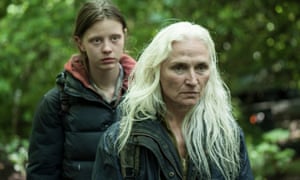The 50 best films of 2018: No 5 – Private Life
Kathryn Hahn and Paul Giamatti were excellent as a sympathetic New York couple struggling to have a baby in Tamara Jenkins’s intensely personal drama
After her intriguing, if flawed, sibling drama The Savages in 2007, Tamara Jenkins has returned with another intensely personal film. It is a triumph. She shows an uncanny knack of absorbing and transforming her own experiences into a compelling movie. Private Life is superbly acted and written, giving the audience vivid access to a painful yet funny human drama.
Kathryn Hahn, a seasoned comedy-character turn, is an absolute revelation in the demanding role of Rachel, a New York literary author who has critical prestige but not much in the way of sales. Her partner is Richard, a former off-Broadway theatre director who has retired from this business, without much regret, and now makes a living selling his pickles at artisanal markets. This is a role made for Paul Giamatti, and it is a pleasure to see him in a challenging part to be compared with those in the movies that made his name: American Splendor and Sideways.
Rachel and Richard are trying to have a baby, either by fertility treatment or by adoption. We can see how they have reached the autumn of their lives, taken stock of their careers, and now want their relationship to mean something – with a baby. But they have left it very late. The adoption process means making online contact with a likely young pregnant woman and arranging to take her baby, and it is a minefield – the mother can change her mind or she can reveal that for various reasons she was never serious about adoption. As for IVF, that is a brutally punishing, intimately upsetting, financially ruinous business to have to go through over and over again. But just when Rachel’s eggs look as if they are not viable, it seems they have found an egg donor. Richard’s stepniece Sadie – his brother’s stepdaughter by marriage and a longtime family friend – offers to donate one of hers, in return for lodging with her cool uncle and aunt in their New York apartment while she tries to establish herself as a writer. It’s a great role for relative newcomer Kayli Carter.
Giamatti and Hahn are excellent at portraying an intelligent, sympathetic couple who are going through denial. They are submitting to a kind of agony. It is horrible, but they have to endure it, and behave as if everything is normal. And so they are pathetically grateful to this impulsive, sweet-natured, generous if scatterbrained young woman who is prepared to make a remarkable gesture of love and friendship to them. But of course it is fraught with difficulty. She should not have sex while she is having the hormone treatment, and for Richard and Rachel to police this rule is horribly embarrassing. Could it be that they have, in fact, already acquired a child – Sadie?
A hostile approach to this film would be to dismiss it with the boorish phrase “first world problems”, and a different type of film would satirise all three principal players in an attempt to forestall that objection. But Jenkins’s script is funny, smart and sweet without ironising anyone. Sadie in particular isn’t the brat that you might expect her to be. Richard and Rachel are creatures of their time and of their background of course, but their humanity is so persuasive. It’s a richly satisfying film.



























